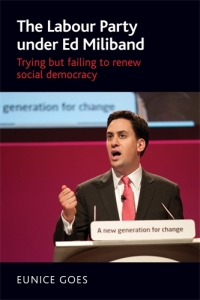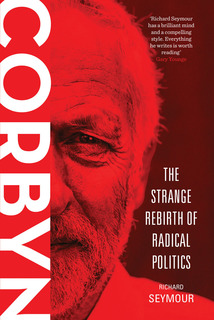J.A. Smith reflects on two new books from major publishers on the condition of the Labour party today, assessing the future, Corbyn and the alternatives.
Eunice Goes, The Labour Party Under Ed Miliband: Trying But Failing to Renew Social Democracy (Manchester University Press, 2016) 214pp.
Richard Seymour, Corbyn: The Strange Rebirth of Radical Politics (Verso, 2016) 246pp.
Poor Ed. Made preposterous in the eyes of everyone, “Kinnocked like no one was ever Kinnocked before”, yet in one form or other his politics are everywhere. Even before Theresa May entered Downing Street with words explicitly echoing the Miliband project of a reformed capitalism, George Osborne had been raiding Labour’s 2015 manifesto in a bid to rebrand the Tories as the true party of the workers. On the Left, the Shadow Chancellor John McDonnell has worked to provide a “New Economics” forum for challenging Tory orthodoxy on the economy in a series of public forums by alternative economists. As we are reminded in Eunice Goes’s superb study of Miliband’s programme, The Labour Party Under Ed Miliband, such guiding stars for this and for Labour economics under Corybn as Mariana Mazzucato, Joseph Stiglitz and Ha-Joon Chang, were already such under Miliband. Corbyn’s leadership rival, Owen Smith meanwhile, is this week “weaponising the NHS” like it’s 2015 all over again.

There is not much good will for the previous leadership among Corbyn’s supporters today, even if Corbyn’s opponents have been happy to blame his rise on the edging Left of new members and new constituency candidates occurring during Miliband’s tenure. In a book heavy with detail of the century-long run up to Labour’s current predicament, Richard Seymour’s Corbyn: The Strange Rebirth of Radical Politics speaks for many Corbyn supporters in dispatching within a few pages “the ill-fated attempt to triangulate the hard Right on race and immigration, the pandering to anti-welfare resentment and the defensive British nationalism” that allegedly sealed Ed’s defeat.
Yet it is difficult to read Goes’s book without a sense of recognition that Miliband’s challenges are also Corbyn’s. Contrary to the common legend of the election’s aftermath, Miliband did not lose by being “too Left wing” (Goes and Seymour agree here), but nor was it, as Corbyn put it during the first leadership contest, that the public saw a choice between “austerity” and “austerity lite” and simply went for the authentic version. As Goes demonstrates, Labour’s predicament is that of numerous broadly social democratic parties across Europe, many of which followed the pattern of taking power by embracing the “Third Way” of investing in public services with the fruits of untrammelled markets in the 1990s, before falling into opposition in the 2000s. By the time of the financial crash in 2008, some of these opposition parties saw the opportunity for some kind of reform of capitalism, but had become too entrenched institutionally and intellectually in scepticism of the state and of regulation to meaningfully act on it (so France’s Socialist Party, Germany’s SDP, and eventually Miliband’s Labour). Others, such as those in power in Greece, Spain, and Portugal, operated in conditions too economically precarious to configure an alternative to the economic impositions of the Stability and Growth pact and the German government. The Faustian bargain social democrats made with the markets in the 90s was now called in, and none could articulate what they were for in the lean times when the market was not delivering. The Third Way was a neat trick, but you could only play it once. Or as the spikier Seymour has it, it was “as useful as a paper umbrella, only any good until it starts raining”.
Like the other major social democratic parties in Europe, then, Miliband’s Labour inherited a situation in which any alternative economic vocabulary to that of free market neoliberalism had become so intellectually eroded in itself and so counter-intuitive to mainstream discourse as to be virtually unvoiceable. It also faced a public that found the Conservative/media narrative that over-spending had contributed to the crisis a congenial one, especially when it was accompanied by the opportunity to deprive the perceived undeserving beneficiaries of the welfare state. At the same time, the far Right was offering up its own silver bullet solutions in the form of the bogeymen of immigrants and the EU. Leftist alternatives beyond the very tentative were more or less off the table, as even if there had been an appetite for them, the tabloid confection of Miliband as “Red Ed” made anything looking like a step to the Left into a liability. The word “welfare”, Goes tells us, was expressly forbidden on Miliband’s frontbench.
In this light, reading Goes’s book becomes an odd experience. There is something admirable about the resourcefulness with which Miliband’s team went about placating the various wings of the Labour Party, addressing themselves to the disparate constituencies of Labour’s prospective supporters, and finding fresh intellectual responses to what Goes refers to as the “policy puzzles” of the moment. Seymour is surely right in the final analysis to be scornful of the “Blue Labour shenanigans” by which Miliband attempted to return Labour to the bosom of its lost working class supporters during this time: not least because its advocacy of localism and community pride tipped so easily into what looked like an indulging of anti-immigrant populism. But at the same time, even this represented an intellectual adventurousness and eclecticism in attempting to find alternatives to the reigning model of economic and social individualism that are rare in UK politics today.
Yet the most generous reader takes this in with a tremendous sense of waste: that these explorations in ideology and policy were for nothing because the keystone issue was never addressed. For the time being in Britain today, “austerity” – reducing the deficit via large scale cuts to public spending – is a dead project. Long counselled against by such bastions of revolutionary socialism as the IMF, the Obama administration, and The Economist magazine, the project David Cameron and George Osborne placed at the heart of their agenda has been one of the more surprising casualties of the EU Referendum.
The language of the Tories since Cameron’s resignation is all fiscal stimulus and fighting inequality. Besides, it may be that Cameron and Osborne never believed in austerity all that much in the first place. The Coalition’s cuts – damaging as they were – did not usually match the scale of Osborne’s rhetoric: especially after 2013, when, as Goes reminds us, Osborne “changed its approach to deficit reduction by slowing down the pace of public spending cuts and by putting in place a mini-stimulus programme”. The repeated slogan “long term economic plan” that won Cameron the election should be remembered – if at all – with the scorn of irony, since it is unclear where the arrogantly called and hopelessly executed referendum on EU membership was supposed to have fitted into that.
It is strange then, to remember how insurmountable the terms set by Cameron and Osborne seemed in 2010-15. Neither Miliband, nor his paid-up Keynesian shadow chancellor Ed Balls, were personally convinced by the argument for the ultimate priority of deficit reduction via spending cuts. But the intellectual confidence was lacking, in particular, in the face of party colleagues whose imaginations could not stretch beyond conceding everything to the Tory narrative in the name of “credibility”. Goes’s study shows that Miliband’s Labour had a considerably nimble and at times innovative set of ideas behind it. And yet, having capitulated to the need to be “realistic” about the necessity of austerity, its ambitions were necessarily fudged, played down, or equivocated about when it came to Labour’s offer at the election itself. In the end, Miliband’s team lacked the will to underwrite their policy ambition with a clear case for the economic programme required to execute it.
And this marks the major difference between Miliband and Corbyn: indeed, perhaps it goes some way to explaining why, in the face of abysmal polling and institutional chaos, the Labour membership remains so loyal to Corbyn. After years of having to defend in the name of electability measures that they consider to be unjustified or based on untruths – such as hard lines on law and order and welfare under New Labour, or austerity itself under Miliband – Labour members now have a leader who, in Seymour’s words, “is prepared to challenge more than the establishment; he aims to run against popular prejudice”. This is not just a matter of placing ideological purity above the adult compromises of power, as Corbyn’s detractors endlessly claim. It is about recognising that what happened to Miliband’s Labour happened in part because of a long-term failure by the party to challenge the snowballing and reaffirmation of prejudices that in themselves make future Left or social democratic governments less likely. Indeed, Seymour reminds us that in its disgraceful populism on race and immigration, and the detoxification of Thatcherite economic norms its acceptance of them precipitated, New Labour often contributed to that reaffirmation.

Seymour has aimed to write a book that “won’t leave anyone entirely comfortable”. Candid about the scale of challenge Corbyn is facing and about the historical nature of the Labour Party (Corbynites with a faith in “real Labour”, only recently sullied by “Blairites”, are in for some troubling lessons), Seymour will also confirm many Corbyn-sceptic’s worst fears, that those who support the leadership are in it with some other project in mind than winning the 2020 election. The times are unpredictable (how much has changed in the couple of months since Seymour’s book was published?) and Seymour does not rule anything out. But a more realistic project, and a more realistic measure of Corbyn’s success, is in aiming to shift the reactionary discourse that at present stops people voting for Left/social democratic parties – whether in the mould of Miliband or of Corbyn – in the first place.
In this regard, Labour’s ballooning membership under Corbyn is not – as his critics tend to maintain – a slightly dotty fanclub, but the party’s greatest source of potential. For Seymour, this is because “the battle to win ideological space is clearly not something that can be separated from the necessity of grassroots political organisation. It is not possible to shift people’s beliefs and assumptions without regularly spending time with them”. Until Labour’s other factions can offer a rival prospectus for changing the conditions under which Miliband lost and Corbyn is struggling, they will be a dead end. Suffice to say Owen Smith’s offer of “Corbynism without the membership” does not so far feel like such a prospectus.
J.A. Smith is Lecturer in English Literature at Royal Holloway University. He is the author of Samuel Richardson and the Theory of Tragedy with Manchester University Press and is now writing Other People’s Politics for Zero Books.
Please support the HKRB and look out for more interviews and reviews by following our Facebook page and Twitter account.
